What's this harp stand being used for?
12




















12
What's this harp stand being used for?
|
Note the harp stand in the middle of this image:
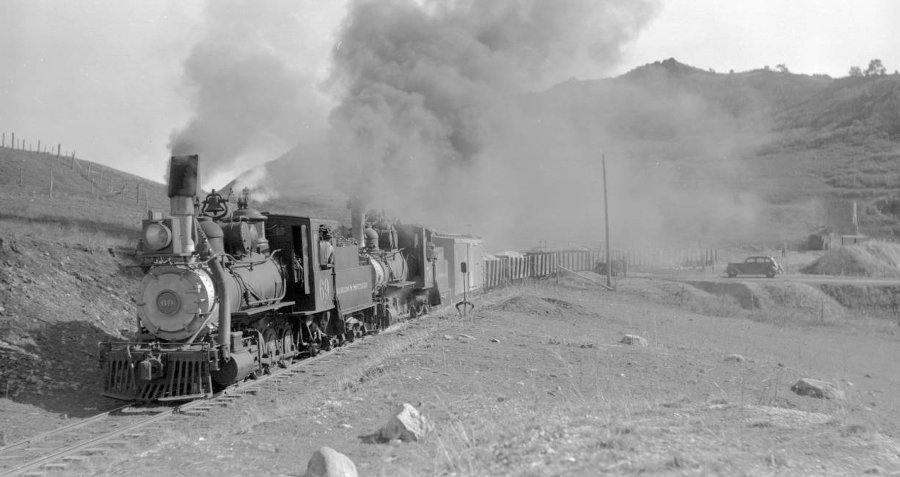 http://digital.denverlibrary.org/cdm/singleitem/collection/p15330coll22/id/42571/rec/6 This is near the end of the Silica branch, where there is a siding. However, it's a bit farther down the line. (There's a fence/cattle grid, then the road, then another fence/cattle grid, and then the siding turnout.) The siding turnout uses an Elliot stand: 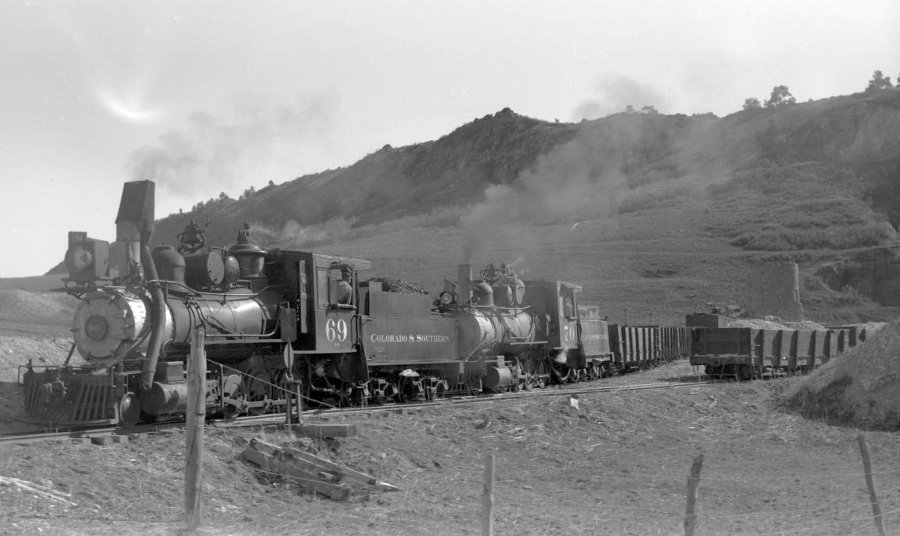 http://digital.denverlibrary.org/cdm/singleitem/collection/p15330coll22/id/42564/rec/4 So what's the harp stand being used for in the first image? Cheers, Jeff. |
Re: What's this harp stand being used for?
|
Re: What's this harp stand being used for?
|
Otto Perry took another shot before the train reached that stretch. I don't see any evidence of a derail (although I don't exactly know what one looks like):
 http://digital.denverlibrary.org/cdm/singleitem/collection/p15330coll22/id/42565/rec/1 Jeff. |
Re: What's this harp stand being used for?
|
usually, the derail that would be used in a situation like this would be undetectable as the harp stand would be used to move one rail from being in line with the normal rail to an open or derailing position, kind of like a one sided stub switch.
Rick |
Re: What's this harp stand being used for?
|
And would it be typical for a harp to be in the middle position for a derail? (A 2-way stub is either right or left, but maybe a derail is treated differently?)
While we're on the topic, what exactly is the purpose of a derail? Just to keep un-attended cars from rolling down the line? Or to catch run-away trains? Or both? Thanks, Jeff. |
Re: What's this harp stand being used for?
|
Re: What's this harp stand being used for?
|
In reply to this post by Jeff Young
Target practice?
Does it mark the location of an uncoupling magnet?
Keith Hayes
Leadville in Sn3 |
Re: What's this harp stand being used for?
|
Could it be the Ghost of Switches Past?It doesn't appear to be connected to the track anywhere.
|
Re: What's this harp stand being used for?
|
I know this is going to read like I'm grumpy, because there is no way to infer tone of voice here but it really is a Derail, like Rick said above. You don't really think that those Enginemen are going to run through a set Derail do you?
 It should be obvious from the pictures that they are indeed switching the sidings and therefore the Derail is set for the "main". And yes, enlarging one of the series of photos shows the single headblock present, remember that that is all there is as Rick said. It should be obvious from the pictures that they are indeed switching the sidings and therefore the Derail is set for the "main". And yes, enlarging one of the series of photos shows the single headblock present, remember that that is all there is as Rick said.
The same, more clearly is here, but at Rico on the RGS, so just a link to the Bob Richardson picture http://digital.denverlibrary.org/cdm/singleitem/collection/p15330coll22/id/75642/rec/46 As there is/are no cars on the trestle, the track Derail has been left lined for the through movement, should it ever come. If any cars were left up on the trestle, then it would have been left in the open position. Jeff, it was common on the C&S to use the Harps for this purpose, the arm in the centre or vertical position is easier to spot for the safe passage of traffic. Idaho Springs had one on the downgrade end of the long siding in the downtown. Note that in this wonderful view that the mainline is actually in the process of being switched and the siding has cars on it hence the Harp off on the diagonal, set in the protecting position. 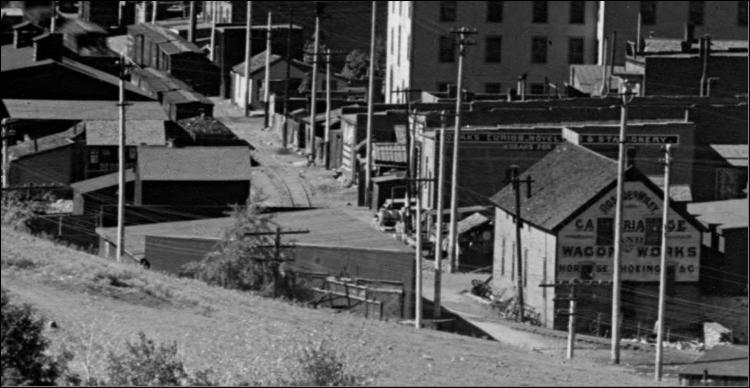 http://digital.denverlibrary.org/cdm/fullbrowser/collection/p15330coll22/id/77856/rv/singleitem Another was on the downgrade Denver end of the short timberyard siding at the Newhouse tunnel, later Argo Mill. 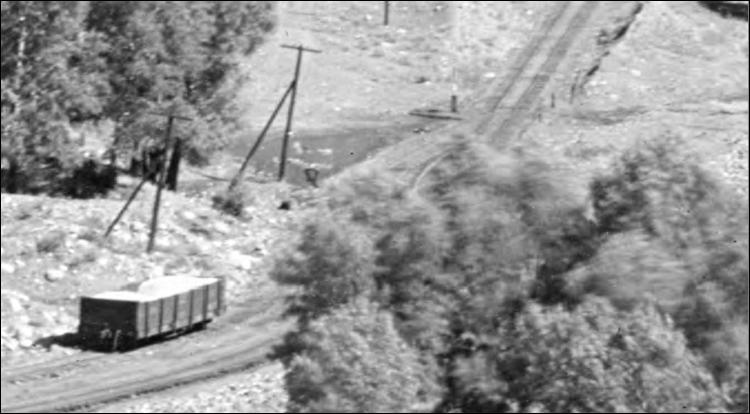 http://digital.denverlibrary.org/cdm/fullbrowser/collection/p15330coll22/id/77714/rv/singleitem/rec/6 A different non-switchstand operated Derail on the C&S, again in Idaho Springs on the Chamberlain-Dillingham Co's Scale siding, is shown quite clearly in Roper's http://coloradosouthern.blogspot.com/2014/10/case-of-missing-truss-rods.html
UpSideDownC
in New Zealand |
Re: What's this harp stand being used for?
|
Great stuff, everyone, but now I’ve got more questions. ;)
The Silica derail target is un-notched (that is, a single rectangle rather than the standard DSP&P turnout target which looks more like two diamonds). I can’t tell in the Idaho Springs shots, and the RGS may have followed the D&RGW style where all targets are un-notched (even for turnouts), so those aren’t definitive. Which leaves me with the question: were all (most?) C&S derail targets un-notched? In the RGS and Roper cases it appears that the moving rail was upgrade (toward the unattended cars). Is that generally true? The RGS one has tie bars and clearly opens both rails. The Roper shot would appear to open only one rail. In both those cases, follow-on rail is included. Does the lack of follow-on rail in the Silica case suggest that they went to as little effort as possible and only one rail opens? Or is the Silica case just a much later example, when they were no longer installing follow-on rail, and could be either single-rail-opening or double? Thanks, Jeff. |
Re: What's this harp stand being used for?
|
This post was updated on .
The RGS Derail is fitted with 3-way Stub Headblocks with extra rails spiked down from the third position, the Harp cannot throw the siding rails over onto the extra rails. Those extra rails are to guide the rollaway car straight along the ties without deviating which would in that location possibly cause more problems.
Basically the idea is to stop the cars from fouling the Mainline. In the case of the Silica derail, being at the end of a branchline, I guess the grades are light and there is really no need for any deflecting rails. The scaletrack at the Chamberlain has a deflecting rail. The Derail with open rail in the Normal postion is always downgrade on the siding, there being no need in this case to place one on the upgrade end of a siding. The Roper Blog shot picture is of a thrown over casting not operated by a sw-st. And that target at Silica seems to me to be an oddity, not the usual. The DSP&P type of the original fabricated Harp sw-st at Buffalo for example, was similar of this type, maybe a throwback? Beaver Brook has been the only CC harp I've seen with that style, then that too went to the double diamond. see http://c-sn3-discussion-forum.41377.n7.nabble.com/One-For-The-Buffalo-Hunters-td1605.html
UpSideDownC
in New Zealand |
Re: What's this harp stand being used for?
|
I understand that there’s only a need for a derail on the downgrade end of a siding. I was trying to ask the orientation of a derail, but I think those deflecting rails answer the question: the roll-away cars always approach the derail from the moving rail direction. (In other words, they never roll off the end of the fixed rail into the gap left when the moving rail opens.)
That Buffalo target is an excellent counter-example to any suggested pattern regarding derails vs. turnouts. So we can’t make any assumptions about what type of target was on other derails. What about where they were found? Can we assume a siding on a grade, or an upgrade spur would always have a derail? Or is there no consistent pattern here either? (On that note I went to look at my ICC maps, and lo and behold, there’s a little angle marked on the Silica branch with “D.R. & sign”. Further up the line the Bolton Quarry spur has no derail. But it’s possible that one’s flat. I’ll have to do some more research with the maps….) Thanks, Jeff. |
Re: What's this harp stand being used for?
|
In reply to this post by Chris Walker
Derails don’t appear to be very common — or they’re not always marked on the ICC maps.
I examined the High Line from Robinson to Como and found only one (on a spur in Puzzle, just above Breckenridge). Cheers, Jeff. |
Re: What's this harp stand being used for?
|
By the time of the ICC Field Notes and Valuation report, mining in Colorado was already in steady decline, hence fewer spurs for active car loading that required derail protection.
They were likely much more common in the DSP&P-DL&G and early C&S eras.
Jim Courtney
Poulsbo, WA |
Re: What's this harp stand being used for?
|
FWIW, I was reading Mac Poor last night and there's an excellent closeup of the (single rail) derail at Puzzle at the bottom of page 274.
Cheers, Jeff. |
Re: What's this harp stand being used for?
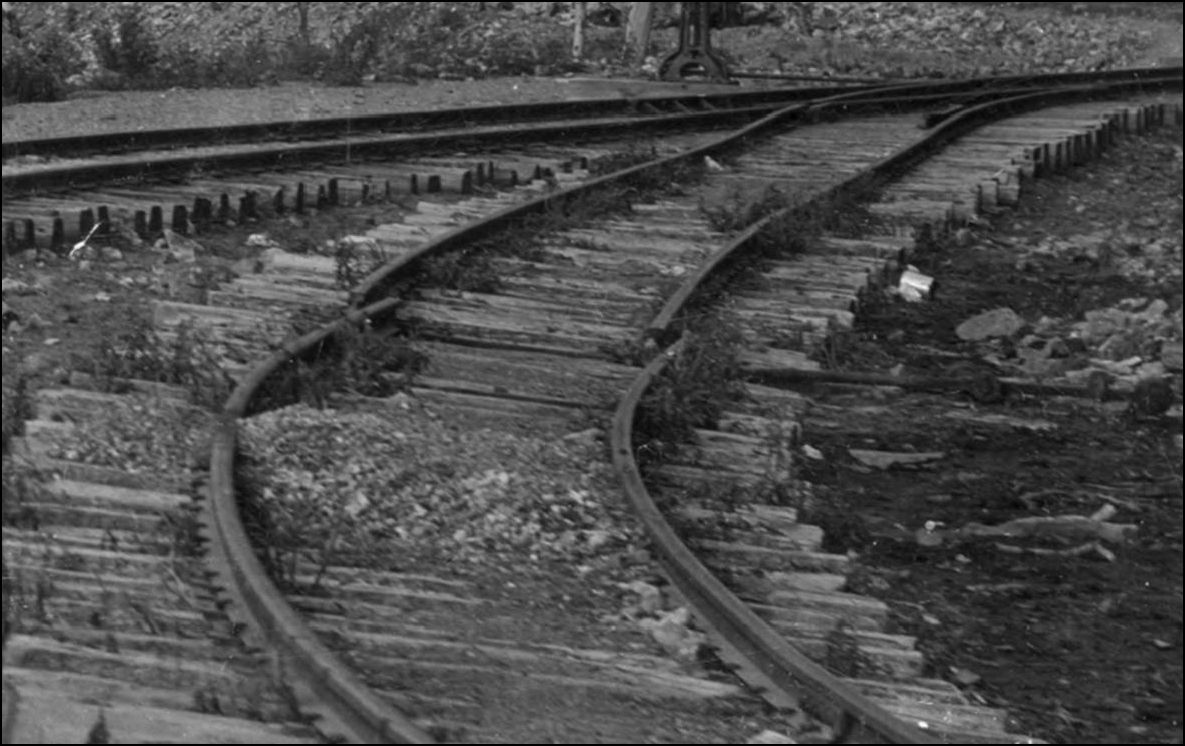 http://cdm16079.contentdm.oclc.org/cdm/fullbrowser/collection/p15330coll22/id/4808/rv/singleitem/rec/19 Not on the C&S though, the F&CC no less but the principle is still the same, and of course, I'm prone to favour that Groundthrow. The use of such may have been more common perhaps thus why Derails don't show up in photos so well.
UpSideDownC
in New Zealand |
Re: What's this harp stand being used for?
|
In reply to this post by Jeff Young
Idaho Springs….
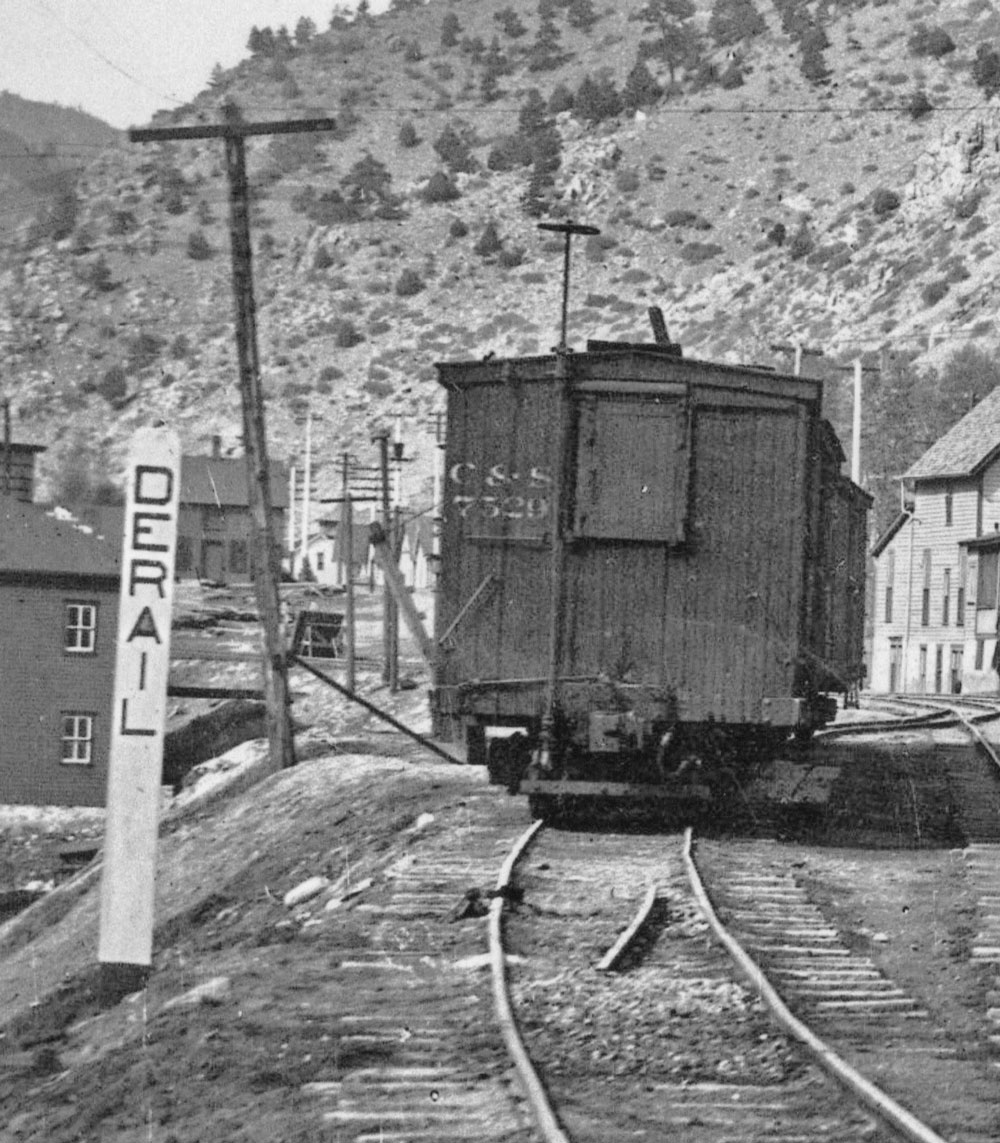
Doug Heitkamp
Centennial, CO |
Re: What's this harp stand being used for?
|
At Breckenridge....
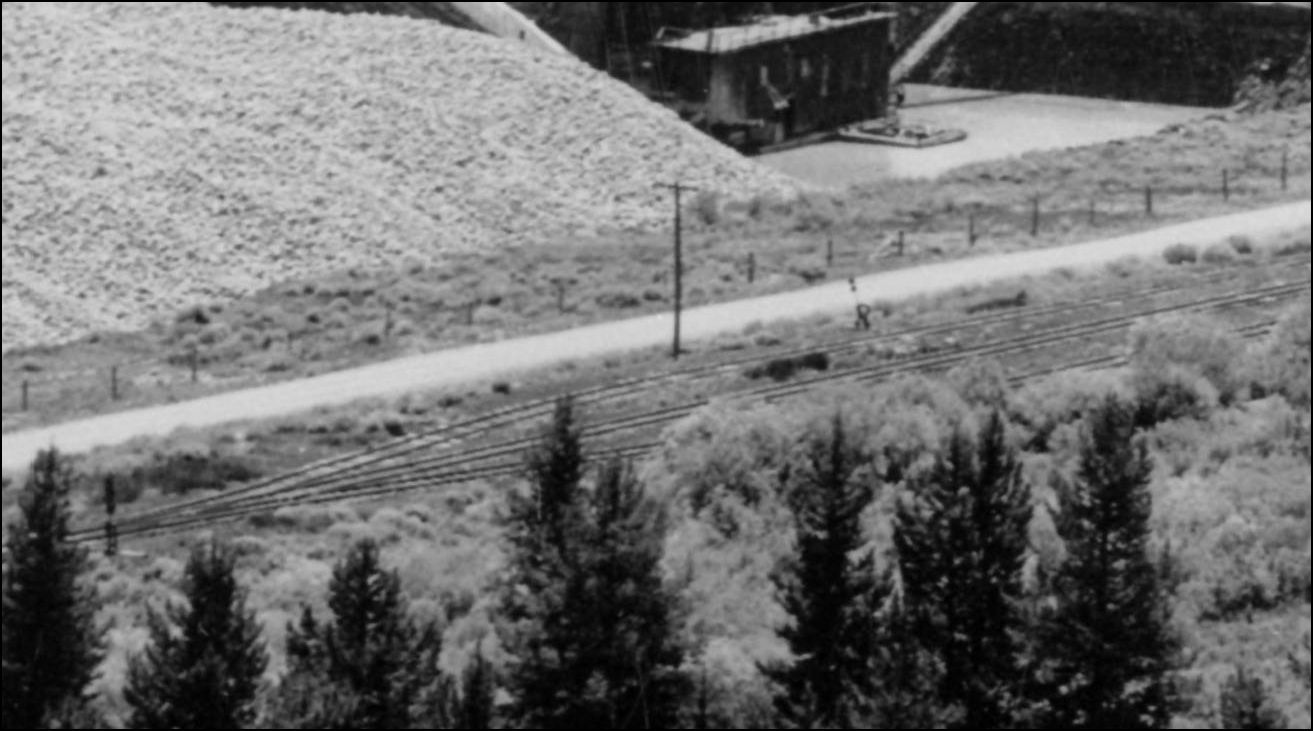 http://cdm16079.contentdm.oclc.org/cdm/fullbrowser/collection/p15330coll22/id/2447/rv/singleitem/rec/514
UpSideDownC
in New Zealand |
Re: What's this harp stand being used for?
|
That full image is a great picture of a dredge chewing its way up the valley.
(To this day, they're still trying to clean up the mess they left below Breckenridge.) Cheers, Jeff. |
Re: What's this harp stand being used for?
|
But that is about as far as the dredge got during the narrow gauge years. After abandonment, I think the same refurbished dredge made it all the way to the east end of town. It is my understanding that parts of the dredge and its pond were converted to a small boutique shopping mall--my wife and I ate lunch there back in 2002.
 Winter of 1936 Makes a nice Christmas card, don't you think? Merry Christmas Jeff, and to everyone on the C&Sn3 Discussion forum.
Jim Courtney
Poulsbo, WA |
«
Return to C&Sng Discussion Forum
|
1 view|%1 views
| Free forum by Nabble | Edit this page |



